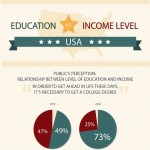 When considering different ways to fund college expenses, some students and parents focus on federal loans, scholarships and grants. While these types of aid can provide the necessary funds to complete a four-year or graduate program, they are not the only options available.
When considering different ways to fund college expenses, some students and parents focus on federal loans, scholarships and grants. While these types of aid can provide the necessary funds to complete a four-year or graduate program, they are not the only options available.
Several banks and private lenders offer private loans for college, which are essentially personal loans that can be used for tuition and other college related expenses. Even if a student applies for federal aid, a private loan can pay for expenses not covered by their government loan.
If you or your child has never considered private student loans, here are four reasons to look into this option.
Flexible repayment plans
If a parent applies for a private student loan to pay his child’s tuition, repayment begins as soon as funds are disbursed. Fortunately, this is not the case for students who apply for their own private loan.
For student who apply, repayment does not begin until six months after graduation from school. This is a plus, as many students need time to find employment and adjust to their new expenses. Of course, students do not have to wait until graduation. There is also the option of making in-school payments. In-school payments can reduces how much a student pays in interest and lowers his overall balance.
Fixed and variable interest rates
Some college students shy away from private lenders because many private loans feature a variable rate. However, fixed rate private student loans do exist. To find these loans, students have to shop around and compare rates with different banks. Fixed rate student loans are desirable because the rate remains the same for the duration of the loan, thus eliminating payment increase and decreases.
Option to add a cosigner
Because private funding is a type of personal loan, banks do require a credit check. Good credit is a criteria for private funding. This can be problematic for college students who do not have a credit history, or those with a limited credit history. But there are ways around this hurdle. Students who need additional funding can add a cosigner – such as a parent – to their loan. This increases the odds of approval, however, the cosigner must have good credit.
Use funds for anything
If applying for a private student loan, funds can be used for more than tuition. This type of personal loan is helpful for covering all college-related expenses, such as books, supplies, a computer, rooming and board, and transportation.
College is expensive, and unfortunately, some people put off their dream of acquiring a higher education because they don’t have enough in savings. But with the help of private student loans, college can be a reality.
A word of advice: Be careful about how much you borrow and gage wisely your ability to repay after graduation. With student debt rising to record levels, smart borrowing should ALWAYS be a priority.










